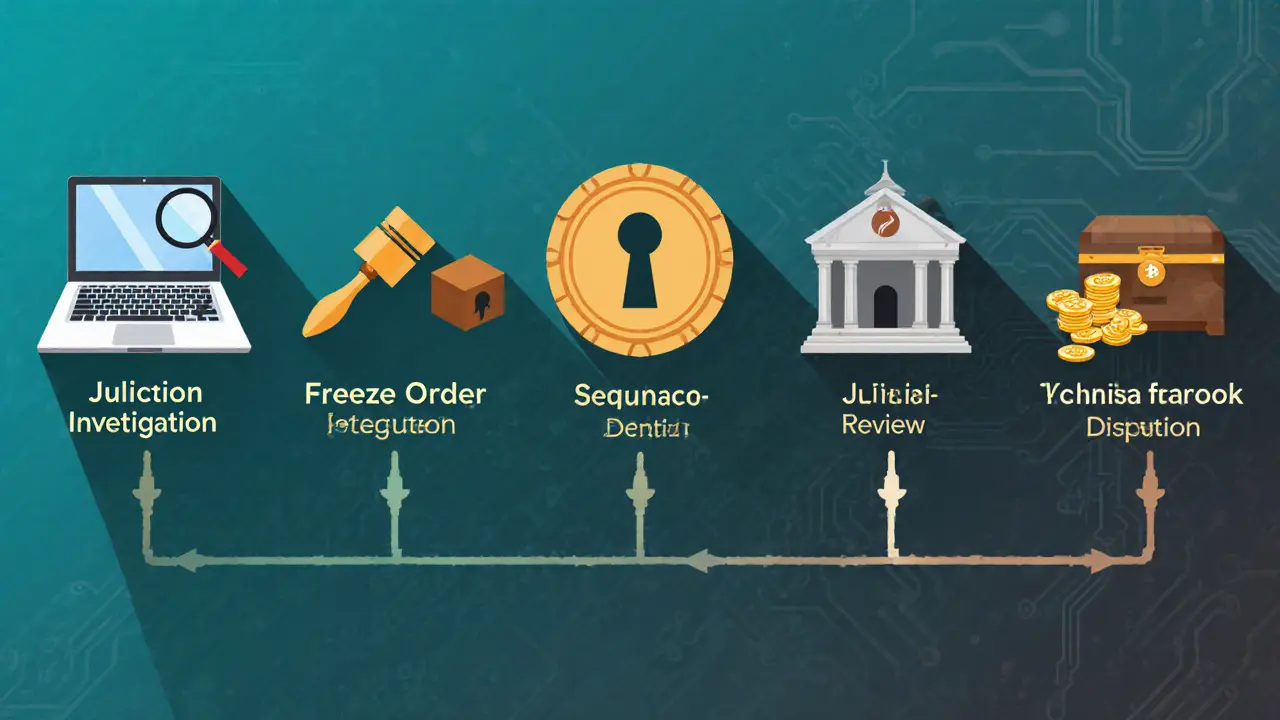How Nepal Seizes Crypto Assets for Violations
 May, 31 2025
May, 31 2025
Nepal Crypto Asset Forfeiture Simulator
Investigation
Police cyber-crime unit identifies wallet addresses and transaction trails.
Freeze
District court issues freeze orders to exchanges, banks, and ISPs.
Seizure
Law enforcement secures private keys and transfers assets to government-controlled wallet.
Judicial Review
Magistrate confirms forfeiture under criminal code.
Disposition
Assets are auctioned, retained, or destroyed by the state.
Potential Penalties
- Imprisonment Up to 5 years
- Fines Up to asset value
- Asset Confiscation Complete forfeiture
- Reputational Damage Criminal record
Safety Recommendations
- Stay clear of crypto activities while in Nepal
- Use permissioned, private blockchains without tradable tokens
- Keep development behind a VPN terminating outside Nepal
- Avoid storing private keys on devices that can be seized
- Consult a local legal advisor familiar with Nepal's laws
Imagine trying to buy a Bitcoin in Kathmandu only to find out the police could literally take it away from you. In Nepal, that isn’t a plot twist - it’s the law. The country treats every crypto‑related activity as a criminal offense, and the government has a clear playbook for snatching the digital assets involved. Below is a plain‑English walk‑through of how asset forfeiture works when someone breaks Nepal’s crypto rules.
TL;DR
- Cryptocurrency is completely illegal in Nepal under the Muluki Criminal Code Act 2017.
- Violations trigger criminal prosecution, fines, imprisonment, and confiscation of any digital assets.
- Forfeiture follows standard Nepalese criminal‑asset seizure procedures, not a separate crypto‑specific regime.
- Authorities use forensic tools, exchange cooperation, and bank‑account tracing to locate and freeze crypto holdings.
- Future policy shifts are unlikely in the short term; staying abroad or using permitted blockchain use cases is safer.
Legal Landscape: What Makes Crypto Illegal?
Cryptocurrency is a digital token created through cryptographic methods that can store value or be used for transactions. In Nepal, the Muluki Criminal Code Act 2017 defines cryptocurrency as any electronically created information, code, token, or virtual asset with commercial significance. Section262(A) explicitly bans mining, trading, storage, and even possession. The Nepal Rastra Bank the nation’s central bank enforces the ban, warning that anyone caught could face hefty fines and up to five years behind bars.
Beyond the criminal code, the country’s Anti‑Money Laundering Act covers money‑laundering, terrorist financing, and related financial crimes treats crypto violations as money‑laundering offenses. This dual‑layered approach means that a crypto trader is not only breaking the criminal code but also triggering AML‑related asset seizure rules.
The Nepal Telecommunication Authority the regulator that blocks internet services has been blocking crypto‑exchange sites since 2021, reinforcing the message that the whole ecosystem is off‑limits.
Why Asset Forfeiture Matters in Crypto Cases
When a crime involves money, most jurisdictions have a mechanism to strip the proceeds from the offender. Nepal is no different. Because crypto assets can be transferred across borders in a flash, the government treats them as “proceeds of crime” under its AML framework. Once a case is opened, law‑enforcement agencies move to locate, freeze, and ultimately confiscate the digital wallets involved.
Even though the law does not spell out a crypto‑specific forfeiture protocol, the process mirrors the standard criminal‑asset seizure steps used for cash, gold, or property. The main difference lies in the technical expertise required to track blockchain transactions and the need to collaborate with overseas exchanges.
Step‑by‑Step: How Nepalese Authorities Execute a Crypto Forfeiture
| Stage | Action | Key Players |
|---|---|---|
| Investigation | Identify wallet addresses, transaction trails, and related bank accounts. | Police cyber‑crime unit, Nepal Rastra Bank, AML office. |
| Freeze | Issue freeze orders to exchanges, banks, and internet service providers. | District courts, NTA. |
| Seizure | Secure private keys, transfer coins to a government‑controlled wallet. | Law‑enforcement officials, forensic specialists. |
| Judicial Review | Judge evaluates evidence, confirms forfeiture under criminal code. | Magistrate, defense counsel. |
| Disposition | Assets are either auctioned, retained for state use, or destroyed. | Finance Ministry, revenue authority. |
Each stage can take weeks to months, depending on how quickly the authorities can trace the crypto trail. Because many exchanges require KYC, Nepalese investigators often request user data from foreign platforms through Mutual Legal Assistance Treaties (MLATs). If the exchange refuses, the courts may still order a blanket freeze of any assets linked to the suspect’s wallet.

Real‑World Examples (What We Know)
Public records are sparse-most cases are settled out of the spotlight. However, media reports from 2022 and 2023 describe a handful of raids where police seized laptops, external hard drives, and hardware wallets alleged to hold Bitcoin and Ethereum. In those raids, the seized devices were taken to a forensic lab, where analysts used blockchain explorers to match wallet addresses to the hardware’s seed phrases.
Even though the exact amount of crypto confiscated isn’t disclosed, the pattern is clear: authorities treat every digital wallet as a potential crime scene, and they will not hesitate to lock it down.
What Risks Do Individuals Face?
If you’re thinking about buying, mining, or simply holding crypto while physically present in Nepal, you’re looking at three major risks:
- Criminal prosecution - up to five years in prison, plus a fine that can equal the value of the crypto involved.
- Asset seizure - any wallet or device linked to the activity can be confiscated, and the assets will be forfeited under the standard criminal‑asset rules.
- Reputational damage - a criminal record for a crypto violation can jeopardize future employment, travel, and banking relationships.
Because the law treats possession as a crime, even a small amount of Bitcoin stored on a phone can trigger the full forfeiture cascade.
How to Protect Yourself (If You Must Operate)
While the safest route is to stay clear of crypto while in Nepal, some businesses still want to leverage blockchain for supply‑chain tracking or healthcare data. The key is to avoid any token that has monetary value. Here’s a quick checklist:
- Use permissioned, private blockchains that don’t issue tradable tokens.
- Keep all crypto‑related development behind a VPN that terminates outside Nepal.
- Never store private keys on devices that can be seized; use multi‑signature wallets with keys held abroad.
- Document every transaction as a non‑financial data point, not a payment.
- Engage a local legal advisor familiar with the Muluki Criminal Code and AML statutes.
Following these steps won’t make you immune, but it reduces the chance that authorities will label your activity as a “crypto violation.”
Future Outlook: Will Nepal Ease Up?
Global trends show more countries moving from outright bans to regulated frameworks. Nepal, however, remains in the 12% of emerging markets that still enforce a total prohibition (2025 data). The government’s public statements through the Nepal Rastra Bank and the NTA signal no imminent policy shift. Unless there’s a major economic shock that forces the state to consider alternative finance, the ban-and the associated forfeiture powers-will likely stay in place for the foreseeable future.
For crypto enthusiasts, the practical advice is simple: either relocate to a crypto‑friendly jurisdiction or stick to non‑monetary blockchain use cases that don’t trigger the criminal code.
Quick Reference Checklist
- Cryptocurrency = illegal under Muluki Criminal Code 2017.
- Any crypto‑related activity can lead to criminal prosecution.
- Asset forfeiture follows standard criminal‐asset seizure rules.
- Law‑enforcement uses blockchain forensics and international exchange cooperation.
- Penalties include imprisonment, fines, and confiscation of digital assets.
- Legal blockchain projects must avoid tradable tokens.

Frequently Asked Questions
Is it possible to own Bitcoin in Nepal if I keep it abroad?
Technically, owning Bitcoin on an offshore wallet isn’t a crime, but if you travel to Nepal with a device that can access it, you risk seizure. The safest bet is to keep any crypto entirely out of the country and avoid carrying private keys while inside Nepal.
Can the Nepalese government seize crypto stored on an exchange?
Yes. If the exchange has a legal presence in Nepal or complies with an MLAT request, authorities can obtain the account details and freeze the crypto holdings just like they would freeze a bank account.
What happens to crypto seized by the police?
After a court confirms the forfeiture, the assets are transferred to a government‑controlled wallet. The state may auction the tokens, use them for public projects, or, in rare cases, destroy them to send a deterrent message.
Are there any legal blockchain uses allowed in Nepal?
Yes, but only if the application does not involve tradable tokens or any form of monetary value. Supply‑chain tracking, healthcare records, and academic credential verification are examples that can be approved, provided they stay token‑free.
How can I challenge a crypto seizure?
You can file an appeal with the district court, arguing that the seized assets are not proceeds of crime or that procedural errors occurred during the freeze. A qualified lawyer with experience in Nepal’s criminal and AML law is essential for a viable defense.
crypto asset forfeiture Nepal remains a high‑risk reality for anyone dabbling in digital currencies within the country’s borders. Understanding the legal framework, the procedural steps, and the severe penalties is the first line of defense. Whether you’re a trader, a developer, or just curious, the safest play is to stay clear of crypto activities unless you’re operating from a jurisdiction that respects the law.


jeffrey najar
May 31, 2025 AT 03:58Hey folks, just a heads‑up if you’re thinking about dabbling in crypto while in Kathmandu: the police aren’t playing around. The Muluki Criminal Code treats any crypto activity as a criminal offense, which means they can seize your wallets, fine you up to the asset’s value, and even throw you behind bars for up to five years. It’s not just a theoretical risk – they actually have a cyber‑crime unit that tracks blockchain transactions and works with exchanges to freeze accounts. If you still want to experiment, keep your private keys off any device you might bring into Nepal and consider using a multi‑signature wallet with keys stored abroad. And, of course, get a local lawyer who knows the ins and outs of the law before you do anything.
Rochelle Gamauf
June 4, 2025 AT 01:47It is astonishing how flagrantly reckless some individuals remain, presuming that mere possession of a digital token within Nepalese jurisdiction might be tolerated. The statutes are unequivocally explicit: any engagement with cryptocurrency constitutes a violation, subject to severe punitive measures, including incarceration and total asset forfeiture. One would be well advised to contemplate the ramifications before persisting in such illicit endeavors.
Jerry Cassandro
June 7, 2025 AT 23:36Quick question for the community: does anyone know if there’s a practical way to prove that a seized wallet actually belongs to you, say via a signed message, before the court decides? I’ve read about forensic labs handling private keys, but I’m curious about any pre‑court safeguards.
Parker DeWitt
June 11, 2025 AT 21:25🚀 Wow, you guys really think the Nepalese police are just messing around? They’ve got blockchain forensics, MLAT requests, and a whole legal framework to boot. If you bring a laptop into Kathmandu, you might as well bring a metal detector for your crypto – they’ll find it! 😂
Allie Smith
June 15, 2025 AT 19:14i think it's kinda wild how the whole world is trying to figure out how to handle digital money and nepal just says "nope", ya know? maybe it's a lesson that sometimes the old ways just stick around longer than we expect. but if you're looking for a new frontier, maybe somewhere a little less "shut down crypto" vibe would be better.
Lexie Ludens
June 19, 2025 AT 17:04Honestly, this whole scenario feels like a thriller that never got funded for a TV series. First, you have the police cyber‑crime unit, which, let’s be real, probably looks like a bunch of people in hoodies watching blockchain explorers 24/7. Then there’s the district court issuing freeze orders – imagine a judge sitting there, sipping tea, and saying, “Freeze those Bitcoin, gentlemen.”
Next up, the seizure phase: they actually get their hands on private keys. I picture a dramatic moment where officers smash open a laptop, only to find a hardware wallet hidden under a stack of old Nepalese stamps. The forensic specialists then transfer the coins to a government‑controlled wallet – which, let’s be honest, probably sits on a server somewhere that looks like a dusty corner of a Ministry office.
After that, we have the judicial review. The magistrate sits, flips through legal code, and confirms the forfeiture. It’s almost bureaucratic poetry. Then the assets are disposed of – auctioned, kept, or destroyed. I can see a headline: “Government destroys 10 BTC, declares war on digital rebellion.”
All of this illustrates the massive machinery behind a simple act of holding crypto. The message? If you value your digital assets, keep them far, far away from Nepal’s reach. Or, better yet, don’t hold them at all if you plan to step foot in Kathmandu. The stakes are high, the process is painstaking, and the outcome is, frankly, terrifying.
Aaron Casey
June 23, 2025 AT 14:53Re: the seizure phase – law enforcement typically enlists crypto‑forensics firms that specialize in blockchain analysis. These firms can trace wallet clusters, decode transaction patterns, and even identify exchange KYC data via mutual legal assistance treaties. The technical jargon is dense, but in plain terms: they map the flow of funds, correlate wallet addresses with known exchange accounts, and request user data from the exchange. Once they secure the private keys (often recovered from seized hardware wallets), they use a cold‑storage transfer protocol to move the assets into a government‑controlled cold wallet, ensuring no “double‑spend” attacks can occur during the hand‑off.
Leah Whitney
June 27, 2025 AT 12:42That explanation is super helpful, Aaron! It shows why the whole process can take weeks or even months – the coordination between forensic analysts, exchange compliance teams, and the courts is no joke. For anyone thinking about traveling to Nepal with crypto, the safest bet is definitely to use a multi‑sig setup with keys stored offshore and to avoid any device that could be searched.
Lisa Stark
July 1, 2025 AT 10:31From a philosophical perspective, the Nepalese stance underscores a broader tension between state sovereignty and the decentralized ethos of blockchain. By imposing total prohibition, the government asserts control over monetary sovereignty, yet it also stifles innovation that could benefit society. The challenge lies in finding a middle ground where regulatory oversight ensures security without suffocating the transformative potential of distributed ledger technology.
Logan Cates
July 5, 2025 AT 08:20Sure, the government can freeze your crypto, but have you considered that the whole system is a lie? All these “legal” steps are just a front for a global cabal to control wealth. If you’re brave enough to hold Bitcoin, you should be hiding it in the deep web, not trusting any court to be fair.
Shelley Arenson
July 9, 2025 AT 06:09👍 Great summary! This really clarifies what could happen if you’re caught with crypto in Nepal. Thanks for the detailed breakdown.
Joel Poncz
July 13, 2025 AT 03:58i hear u. if u r thinkin bout bringin crypto to nepal, just dont. i mean u could lose everythin in a snap. stay safe.
Kris Roberts
July 17, 2025 AT 01:47Whoa, this is intense! I had no idea the process was that elaborate. Kudos to the poster for laying it all out. Makes me think twice about any crypto trips.
lalit g
July 20, 2025 AT 23:36I appreciate the neutral tone of this post. It’s important to share factual information without inflaming tensions. Hopefully readers will make informed decisions.
Reid Priddy
July 24, 2025 AT 21:25One could argue that the whole narrative is manufactured to justify state control. Yet, without concrete evidence, such claims remain speculative. It is prudent, however, to acknowledge the existing legal framework.
Shamalama Dee
July 28, 2025 AT 19:14Thank you for providing such a thorough analysis. It is essential for anyone considering crypto activities in restrictive jurisdictions to understand both the legal risks and the procedural steps involved.
scott bell
August 1, 2025 AT 17:03Interesting breakdown! The whole forensic chain-from blockchain analytics to court orders-is a real eye‑opener; i guess there’s no magic shield against the law.
vincent gaytano
August 5, 2025 AT 14:53Sure, the government will ‘seize’ your crypto… as if they don’t already control every transaction through the very exchanges they force to comply. Nice try.
Dyeshanae Navarro
August 9, 2025 AT 12:42In simple terms, if you keep your crypto out of Nepal’s borders, you avoid the legal trouble. The rules are clear, and the enforcement is active.
Matt Potter
August 13, 2025 AT 10:31Stay away from crypto in Nepal; it’s not worth the risk.
Marli Ramos
August 17, 2025 AT 08:20lol this is crazy 😂💀 but seriously, keep those keys on a USB and lock it in a safe if you must. otherwise, just don’t bring any crypto with you!!!
Christina Lombardi-Somaschini
August 21, 2025 AT 06:09In conclusion, the Nepalese government's unequivocal prohibition of cryptocurrency, as enshrined in the Muluki Criminal Code of 2017, imposes severe legal ramifications-including imprisonment, monetary fines, and complete asset forfeiture-for any crypto‑related activity within its jurisdiction. Accordingly, individuals who intend to travel to or reside in Nepal should meticulously assess the associated risks, consider alternative, non‑monetary blockchain applications, and, where feasible, retain their digital assets outside the country's territorial reach. For those who nonetheless pursue crypto endeavors, it is imperative to adopt robust operational security measures, such as employing multi‑signature wallets with keys stored abroad, utilizing VPNs that terminate beyond Nepal's borders, and engaging competent legal counsel versed in Nepalese criminal and anti‑money‑laundering statutes. By adhering to these recommendations, one may mitigate exposure to punitive actions, though the inherent uncertainties of enforcement render any involvement in cryptocurrency within Nepal a high‑risk proposition.